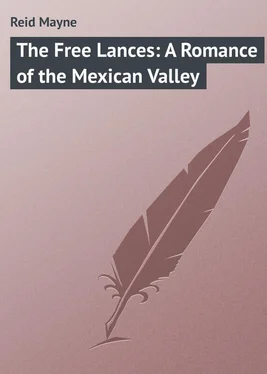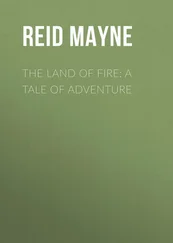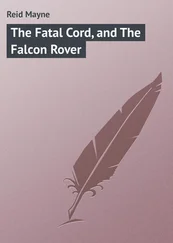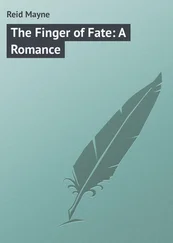Mayne Reid - The Free Lances - A Romance of the Mexican Valley
Здесь есть возможность читать онлайн «Mayne Reid - The Free Lances - A Romance of the Mexican Valley» — ознакомительный отрывок электронной книги совершенно бесплатно, а после прочтения отрывка купить полную версию. В некоторых случаях можно слушать аудио, скачать через торрент в формате fb2 и присутствует краткое содержание. Жанр: foreign_prose, на английском языке. Описание произведения, (предисловие) а так же отзывы посетителей доступны на портале библиотеки ЛибКат.
- Название:The Free Lances: A Romance of the Mexican Valley
- Автор:
- Жанр:
- Год:неизвестен
- ISBN:нет данных
- Рейтинг книги:3 / 5. Голосов: 1
-
Избранное:Добавить в избранное
- Отзывы:
-
Ваша оценка:
- 60
- 1
- 2
- 3
- 4
- 5
The Free Lances: A Romance of the Mexican Valley: краткое содержание, описание и аннотация
Предлагаем к чтению аннотацию, описание, краткое содержание или предисловие (зависит от того, что написал сам автор книги «The Free Lances: A Romance of the Mexican Valley»). Если вы не нашли необходимую информацию о книге — напишите в комментариях, мы постараемся отыскать её.
The Free Lances: A Romance of the Mexican Valley — читать онлайн ознакомительный отрывок
Ниже представлен текст книги, разбитый по страницам. Система сохранения места последней прочитанной страницы, позволяет с удобством читать онлайн бесплатно книгу «The Free Lances: A Romance of the Mexican Valley», без необходимости каждый раз заново искать на чём Вы остановились. Поставьте закладку, и сможете в любой момент перейти на страницу, на которой закончили чтение.
Интервал:
Закладка:
Chapter Seven
A Duel “to the Death.”
The duellists stood confronting one another, in the position of “salute,” both hands on high grasping their swords at hilt and point, the blades held horizontally. The second of each was in his place, on the left hand of his principal, half a pace in advance. But a moment more all were waiting for the word. The second of the challenger had the right to give it, and Crittenden was not the man to make delay.
“ Engage !” he cried out, in a firm clear voice, at the same time stepping half a pace forward, Duperon doing the same. The movement was made as a precaution against foul play; sometimes, though not always intended. For in the excitement of such a moment, or under the impatience of angry passion, one or other of the principals may close too quickly – to prevent which is the duty of the seconds.
Quick, at the “engage,” both came to “guard” with a collision that struck sparks from the steel, proving the hot anger of the adversaries. Had they been cooler, they would have crossed swords quietly. But when, the instant after, they came to tierce , both appeared more collected, their blades for a while keeping in contact, and gliding around each other as if they had been a single piece.
For several minutes this cautious play continued, without further sparks, or only such as appeared to scintillate from the eyes of the combatants. Then came a counter-thrust, quickly followed by a counter parry, with no advantage to either.
Long ere this, an observer acquainted with the weapons they were wielding, could have seen that of the two Kearney was the better swordsman. In changing from carte to tierce , or reversely, the young Irishman showed himself possessed of the power to keep his arm straight and do the work with his wrist, whilst the Creole kept bending his elbow, thus exposing his forearm to the adversary’s point. It is a rare accomplishment among swordsmen, but, when present, insuring almost certain victory, that is, other circumstances being equal.
In Kearney’s case, it perhaps proved the saving of his life; since it seemed to be the sole object of his antagonist to thrust in upon him, heedless of his own guard. But the long, straight point, from shoulder far outstretched, and never for an instant obliquely, foiled all his attempts.
After a few thrusts, Santander seemed surprised at his fruitless efforts. Then over his face came a look more like fear. It was the first time in his duelling experience he had been so baffled, for it was his first encounter with an adversary who could keep a straight arm .
But Florence Kearney had been taught tierce as well as carte , and knew how to practise it. For a time he was prevented from trying it by the other’s impetuous and incessant thrusting, which kept him continuously at guard, but as the sword-play proceeded, he began to discover the weak points of his antagonist, and, with a well-directed thrust, at length sent his blade through the Creole’s outstretched arm, impaling it from wrist to elbow.
An ill-suppressed cry of triumph escaped from the Kentuckian’s lips, while with eyes directed towards the other second, he seemed to ask —
“Are you satisfied?”
Then the question was formally put.
Duperon looked in the face of his principal, though without much show of interrogating him. It seemed as if he already divined what the answer would be.
“ A la mort !” cried the Creole, with a deadly emphasis and bitter determination in his dark sinister eyes.
“To the death be it!” was the response of the Irishman, not so calmly, and now for the first time showing anger. Nor strange he should, since he now knew he had crossed swords with a man determined on taking his life.
There was a second or two’s pause, of which Santander availed himself, hastily whipping a handkerchief round his wounded arm – a permission not strictly according to the code, but tacitly granted by his gallant antagonist.
When the two again closed and came to guard, the seconds were no longer by their sides. At the words “ à la mort ” they had withdrawn – each to the rear of his principal – the mode of action in a duel to the death. Their rôle henceforth was simply to look on, with no right of interference, unless either of the principals should attempt foul play. This, however, could not well occur. By the phrase “ à la mort ” is conveyed a peculiar meaning, well-known to the Orleans duellist. When spoken, it is no longer a question of sword-skill, or who draws first blood; but a challenge giving free licence to kill – whichever can.
In the present affair it was followed by silence more profound and more intense than ever, while the attention of the spectators, now including the seconds, seemed to redouble itself.
The only sound heard was a whistling of wings. The fog had drifted away, and several large birds were seen circling in the air above, looking down with stretched necks, as if they, too, felt interested in the spectacle passing underneath. No doubt they did; for they were vultures, and could see – whether or not they scented it – that blood was being spilled.
Once more, also, from the tree tops came the mocking laughter of the eagle; and out of the depths, through long, shadowy arcades, the mournful hootings of the great white owl – fit music for such fell strife.
Disregarding these ominous sounds – each seeming a death-warning in itself – the combatants had once more closed, again and again crossing sword-blades with a clash that frightened owl, eagle, and vulture, for an instant causing them to withhold their vocal accompaniment.
Though now on both sides the contest was carried on with increased anger, there was not much outward sign of it. On neither any rash sword-play. If they had lost temper they yet had control over their weapons; and their guards and points, though perhaps more rapidly exchanged, displayed as much skill as ever.
Again Kearney felt surprised at the repeated thrusts of his antagonist, which kept him all the time on the defensive, while Santander appeared equally astonished and discomfited by that far-reaching arm, straight as a yardstick, with elbow never bent. Could the Creole have but added six inches to his rapier blade, in less than ten seconds the young Irishman would have had nearly so much of it passed between his ribs.
Twice its point touched, slightly scratching the skin upon his breast, and drawing blood.
For quite twenty minutes the sanguinary strife continued without any marked advantage to either. It was a spectacle somewhat painful to behold, the combatants themselves being a sight to look upon. Kearney’s shirt of finest white linen showed like a butcher’s; his sleeves encrimsoned; his hands, too, grasping his rapier hilt, the same – not with his own blood, but that of his adversary, which had run back along the blade; his face was spotted by the drops dashed over it from the whirling wands of steel.
Gory, too, was the face of Santander; but gashed as well. Bending forward to put in a point, the Creole had given his antagonist a chance, resulting to himself in a punctured cheek, the scar of which would stay there for life.
It was this brought the combat to an end; or, at all events, to its concluding stroke. Santander, vain of his personal appearance, on feeling his cheek laid open, suddenly lost command of himself, and with a fierce oath rushed at his adversary, regardless of the consequences.
He succeeded in making a thrust, though not the one he intended. For having aimed at Kearney’s heart, missing it, his blade passed through the buckle of the young Irishman’s braces, where in an instant it was entangled.
Читать дальшеИнтервал:
Закладка:
Похожие книги на «The Free Lances: A Romance of the Mexican Valley»
Представляем Вашему вниманию похожие книги на «The Free Lances: A Romance of the Mexican Valley» списком для выбора. Мы отобрали схожую по названию и смыслу литературу в надежде предоставить читателям больше вариантов отыскать новые, интересные, ещё непрочитанные произведения.
Обсуждение, отзывы о книге «The Free Lances: A Romance of the Mexican Valley» и просто собственные мнения читателей. Оставьте ваши комментарии, напишите, что Вы думаете о произведении, его смысле или главных героях. Укажите что конкретно понравилось, а что нет, и почему Вы так считаете.












